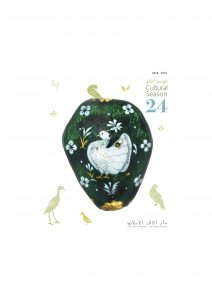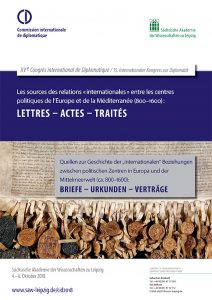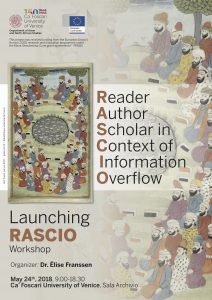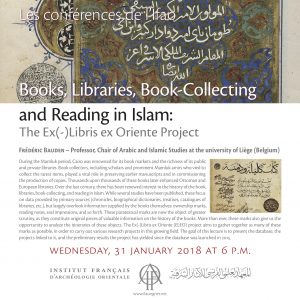Agenda
-
lun17Déc201819h00Dar al-Athar al-Islamiyyah, The Al-Sabah Collection, Al-Kuwait, Koweit
Of Buying Many Books There Is No End: Paratextual Marks as a Source for the History of the Book in Islam. Lecture by Frédéric Bauden
 During the Mamluk period, Cairo was renowned for its book markets and the richness of its public and private libraries. Over the last century, there has been renewed interest in the history of the book, collecting and libraries. Published studies focused on data provided by primary sources, but largely overlook information supplied by the books themselves. Paratextual marks, the focus of this lecture, are now the subject of greater scrutiny, as they constitute original pieces of valuable information on the history of the books. More than ever, these marks also give us the opportunity to analyze the itineraries of these objects
During the Mamluk period, Cairo was renowned for its book markets and the richness of its public and private libraries. Over the last century, there has been renewed interest in the history of the book, collecting and libraries. Published studies focused on data provided by primary sources, but largely overlook information supplied by the books themselves. Paratextual marks, the focus of this lecture, are now the subject of greater scrutiny, as they constitute original pieces of valuable information on the history of the books. More than ever, these marks also give us the opportunity to analyze the itineraries of these objects -
jeu04Oct2018sam06Oct2018Sächsische Akademie der Wissenschaften zu Leipzig
15. Internationaler Kongress zur Diplomatik: Quellen zur Geschichte der „internationalen“ Beziehungen zwischen politischen Zentren in Europa und der Mittelmeerwelt (ca. 800–1600): Briefe – Urkunden – Verträge. Internationale Tagung der Commission internationale de diplomatique in Kooperation mit der Sächsischen Akademie der Wissenschaften zu Leipzig
 In the frame of the 15th International Congress on Diplomatics, Frédéric Bauden (Liège) and Marta Manso Rubio (Universitat de Barcelona - Institució Milà i Fontanals (CSIC)) will read a paper entitled "L’alliance conclue entre le sultan mamelouk Khalīl et le roi d’Aragon Jacques II en 692/1293" on 6 October 2018.
In the frame of the 15th International Congress on Diplomatics, Frédéric Bauden (Liège) and Marta Manso Rubio (Universitat de Barcelona - Institució Milà i Fontanals (CSIC)) will read a paper entitled "L’alliance conclue entre le sultan mamelouk Khalīl et le roi d’Aragon Jacques II en 692/1293" on 6 October 2018. -
jeu24Mai20189h-18h30Sala Archivio, Università Ca' Foscari, Venise
Launching RASCIO - Workshop, organized by Élise Franssen
 This workshop is the opening event of Élise Franssen's Marie Skłodowska-Curie project "RASCIO" (Reader, Author, Scholar in a Context of Information Overflow. How to manage and master knowledge when there is too much to know?" — grant agreement n° 749180; see here).
This workshop is the opening event of Élise Franssen's Marie Skłodowska-Curie project "RASCIO" (Reader, Author, Scholar in a Context of Information Overflow. How to manage and master knowledge when there is too much to know?" — grant agreement n° 749180; see here).It is intended to be a methodological and case-studies’ round-table. The different topics to be addressed are:
- Methodology and note-taking strategies
- Correspondence between scholars/littérateurs and networking
- Scholars’ libraries
- Digital humanities and on-line editions
For the full programme, see: Workshop RASCIO - program.
-
mer31Jan201818h00-19h00Le Caire, Institut Français d'Archéologie Orientale
Books, Libraries, Book-Collecting and Reading in Islam: The Ex(-)Libris ex Oriente Project. Lecture of Prof. Frédéric Bauden
During the Mamluk period, Cairo was renowned for its book markets and the richness of its public and private libraries. Book collectors, including scholars and prominent Mamluk amirs who vied to collect the rarest items, played a vital role in preserving earlier manuscripts and in commissioning the production of copies. Thousands upon thousands of these books later enhanced Ottoman and European libraries. Over the last century, there has been renewed interest in the history of the book, libraries, book-collecting, and reading in Islam. While several studies have been published, these focus on data provided by primary sources (chronicles, biographical dictionaries, treatises, catalogues of libraries, etc.), but largely overlook information supplied by the books themselves: ownership marks, reading notes, seal impressions, and so forth. These paratextual marks are now the object of greater scrutiny, as they constitute original pieces of valuable information on the history of the books. More than ever, these marks also give us the opportunity to analyze the itineraries of these objects. The Ex(-)Libris ex Oriente (ELEO) project aims to gather together as many of these marks as possible, in order to carry out various research projects in this growing field. The goal of this lecture is to present the database, the projects linked to it, and the preliminary results the project has yielded since the database was launched in 2015.


